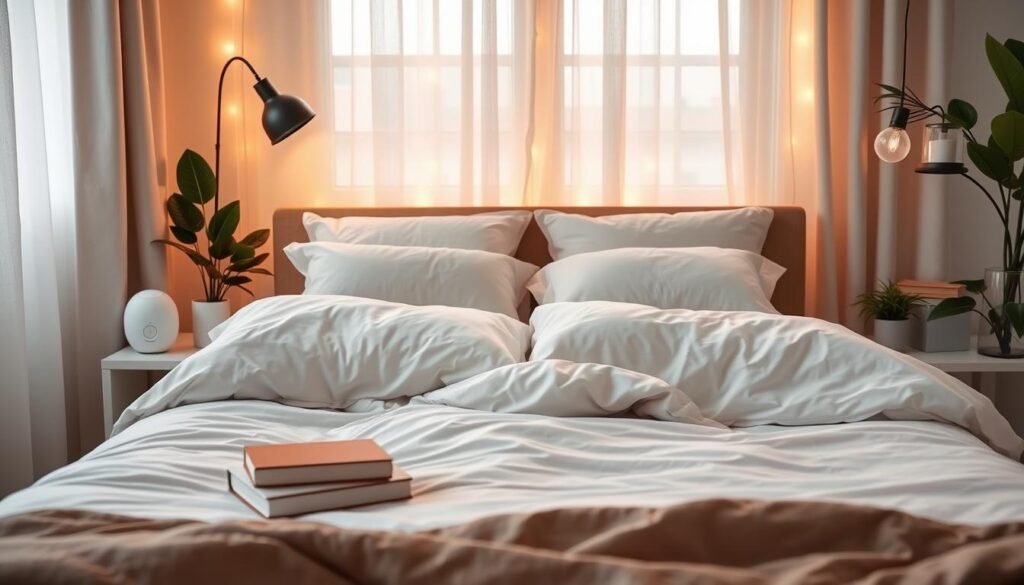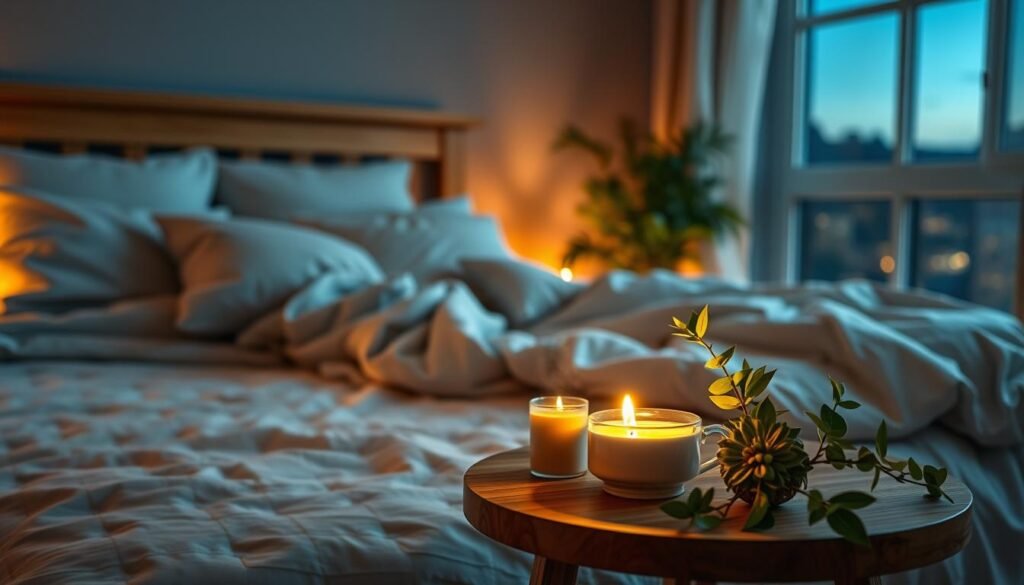Did you know about 30% of adults struggle to sleep well? They have trouble at least three nights a week for more than three months. This issue can really affect your day-to-day life. Luckily, there’s hope. More and more people are picking homeopathic treatments for insomnia. They prefer it over traditional medicine.
Homeopathy uses 100% natural, safe remedies to help with different sleep issues. These remedies tackle both the physical and emotional sides of sleeplessness. The best part? They don’t cause dependency. This means you can stop using them once you start sleeping better. Remedies like Coffea Cruda help calm racing thoughts. Nux Vomica is good for when your sleep pattern is off. They show just how homeopathy can help with insomnia.
Homeopathy does more than just help you sleep. It works to improve your overall mood and health. This article will explore the amazing benefits of natural sleep remedies. It will show how they can change your life.
Key Takeaways
- Homeopathy provides a natural and non-habit-forming approach to treating insomnia.
- Various remedies target specific underlying causes, such as stress and anxiety.
- Effective homeopathic treatments include Coffea Cruda, Kali Phos, and Nux Vomica.
- Understanding insomnia’s roots can lead to more effective management strategies.
- Lifestyle changes play a significant role in improving sleep quality.
- Sleep is crucial for mental and emotional stability, making its quality paramount.
Understanding Insomnia and Its Impact on Health
Insomnia is a common problem. It affects millions worldwide. It makes it hard to fall asleep or stay asleep. This issue can cause people to wake up too early. Knowing about insomnia is important. It can affect both your body and mind. About 10% of people everywhere have chronic insomnia. This number jumps to 50% among those getting medical care. Sufferers may feel more anxious. They may also face mood disorders. This makes their sleep problems even worse.
What is Insomnia?
Insomnia isn’t just about getting too little sleep. It involves several types of sleep problems. People might find it hard to start sleeping. Or they can’t stay asleep. A good night’s rest seems hard to get. This can hurt both personal and work life. The stress from not sleeping well can lead to many health issues. This includes problems with mental health. Research shows 30% of people don’t get better after first treatments for anxiety. This shows we need better ways to fight insomnia.
Effects of Poor Sleep Quality
Poor sleep does more than make you tired. It hits hard on how well you do daily tasks. It can mess with your focus, mood, and decision-making. Bad sleep might increase your risk for serious issues. These include obesity and heart disease. Insomnia also affects overall health. About 50% of people with anxiety or schizophrenia deal with insomnia. This shows the link between mental health and sleeping well. To improve sleep, consider changing your lifestyle. Homeopathic treatments might help with insomnia. Look into natural methods for more advice.
Common Causes of Insomnia
Understanding the causes of insomnia is crucial for tackling this widespread sleep issue. It’s a problem affecting many adults. Studies indicate that up to 10% of people have trouble sleeping. Several factors make it hard for them to get good sleep.
Psychological Factors
Insomnia is often caused by psychological factors. Stress and anxiety can mess with your sleep. Mental health issues like depression make it worse. Around 40 to 60% of people with secondary insomnia are also depressed. This shows how mental health and sleep are connected. Knowing about these psychological factors can help find the right treatments.
Physical Factors
Physical factors are also crucial in affecting sleep quality. Conditions like diabetes and chronic pain can make it hard to relax and sleep well. Hormonal shifts, especially in menopausal women, can disrupt sleep. As many as 30 to 40% are affected. Sleep problems are also more common in older adults. This highlights the need to look into medical conditions when treating insomnia.
Lifestyle Choices That Contribute to Insomnia
Lifestyle choices play a big part in insomnia too. Irregular sleeping patterns and too much caffeine or alcohol hurt your sleep. Not exercising can also make it harder to sleep. These habits worsen insomnia. Making healthy lifestyle changes is key. For more info on treating and managing insomnia, check out reputable sources.
| Factor | Details |
|---|---|
| Psychological | Stress, anxiety, and depression |
| Physical | Chronic pain, diabetes, hormonal changes |
| Lifestyle | Irregular sleep schedules, high caffeine/alcohol intake, sedentary lifestyle |
By fully understanding these causes of insomnia, people can better tackle their sleep issues. Various resources, including discussions on behavioral and medical treatments, offer insight into effective solutions.
Natural Homeopathic Treatment for Insomnia
Many people face challenges with insomnia. Homeopathic treatment is gentle and effective. It not only focuses on sleeplessness but also looks at what causes it. Using natural ingredients, it syncs with the body’s healing. This helps create a balance, making it easier to sleep well.
How Homeopathy Works
Homeopathy treats symptoms holistically. It uses remedies like Coffea Cruda and Nux Vomica to address different sleep issues. This approach not only eases symptoms but also targets the root causes. As a result, it offers a long-lasting solution for better sleep.
Advantages of Homeopathic Remedies
Homeopathic remedies have many benefits:
- Fewer side effects than other medicines.
- There’s no risk of becoming dependent on them.
- They work well for all kinds of insomnia.
- The natural ingredients offer a gentle healing method.
Choosing homeopathy means less worry about the drawbacks of standard drugs. Many find their sleep improves with these remedies, as shown here alternative treatments. Homeopathy tailors treatments to you, fitting the complex nature of insomnia perfectly.
If you’re looking for safe ways to handle insomnia, homeopathy might be the answer. Studies suggest that combining it with mindfulness can boost its effectiveness. For more, visit tackling insomnia.
Top Homeopathic Remedies for Insomnia
Homeopathy offers solutions for insomnia, focusing on individual symptoms. It identifies the most effective remedies to enhance sleep quality and minimize disruptions. Let’s delve into three key remedies for different insomnia issues.
Coffea Cruda for Restlessness
Coffea Cruda is great for those who can’t calm their thoughts at night. If your mind is always on, this remedy may help you relax. It’s ideal for when your busy brain keeps you from sleeping.
Nux Vomica for Sleep Disruption
Nux Vomica is for people who wake up too early and can’t fall back asleep. It’s often recommended for sleep troubles caused by stress or lifestyle issues. Nux Vomica aims to provide a deeper, uninterrupted sleep.
Arsenicum Album for Anxiety-Related Insomnia
Arsenicum Album works well for those whose insomnia is due to anxiety. It helps calm the mind and reduce restlessness, improving sleep. This remedy also aids in achieving emotional balance for better sleep quality.

Sleep Hacks for Insomnia
Sleep hacks truly improve your sleep quality. Using relaxation tricks eases anxiety and gets your body ready for a good night. Adding mindfulness to your sleep strategy makes the approach whole, fighting insomnia effectively.
Relaxation Techniques for Better Sleep
Deep breathing and muscle relaxation are key for better sleep. They soothe your nervous system, cut down stress, and make it easy to fall asleep. Thinking of calm places helps too, clearing your mind to drift off easier.
Doing light stretches or drinking warm herbal tea also helps. These steps prepare you for sleep, making your bedtime routine cozy.
Mindfulness Practices for Restful Sleep
Meditation and gentle yoga before bed have proven benefits. A 2011 study showed meditation improves insomnia and sleep quality. By 2015, meditation with a mantra even helped lower insomnia.
These practices reduce stress and make you feel calm. They prepare you for a deeply peaceful sleep. Following these tips, you’ll find a serene night’s rest.
Improving Sleep Quality with Sleep Hygiene Tips
Good sleep hygiene is a must for beating insomnia. Having a regular sleep schedule tells your body it’s time to relax. Such routines train your mind and help both falling asleep and staying asleep easier. These tips aim for healthy habits that improve rest quality.
Establishing a Sleep Routine
A clear sleep routine gets your sleep on track. It’s important to sleep and wake up at the same times daily. Adjust sleep times gradually to build this habit. Relaxing before bed, like reading or a warm bath, tells your brain it’s sleep time. It helps to avoid things like alcohol and caffeine before bed.
Creating a Sleep-Conducive Environment
For good sleep hygiene, your bedroom matters a lot. A comfy mattress and a cool, dark room can boost sleep quality. Keeping light out with blackout curtains and cutting screen time at night helps too. Noise blockers like earplugs aid in making your room quiet. Adults need seven to nine hours of sleep for best health, highlighting the need for a good routine and setting.

Better sleep hygiene means better long-term health physically and emotionally. To learn more about beating long-term insomnia, check out this guide for helpful advice.
Cognitive Behavioral Therapy for Insomnia
Cognitive Behavioral Therapy for Insomnia (CBT-I) is a powerful tool. It helps people sleep better by changing their thoughts and actions. Instead of just offering a quick fix with drugs, it deals with the causes of insomnia.
What is CBT-I?
CBT-I uses different methods to spot and change sleep-disturbing beliefs. It aims to make new, healthy sleep habits. Usually, it takes 6 to 8 sessions to craft a plan that works for each person.
Benefits of CBT-I for Insomnia
CBT-I has many advantages for those with sleep problems, like:
- Reduction in reliance on medication: People often try sleep pills first. But CBT-I can do better for long-term insomnia.
- Improved sleep quality: Users usually find their sleep improves a lot, leading to better health.
- Lasting effects: The benefits of CBT-I can last, helping people avoid sleep meds.
- Addressing root causes: CBT-I gets to the heart of what causes sleep issues, not just the symptoms.
People who try CBT-I not only sleep better but also cut their risk of other health issues. Conditions like anxiety, depression, and heart problems can get better. With over 10 million Americans on sleep meds, it’s clear we need lasting options like CBT-I. By mixing behavioral changes with good sleep routines, CBT-I is a key choice for addressing sleep troubles.
Managing Stress for Insomnia Relief
Understanding how to manage stress for better sleep is key. Figuring out common stress triggers is crucial. Stress shows itself in many ways, affecting our sleep deeply. Knowing what causes your stress helps you find ways to handle it.
Identifying Stressors
Knowing your stress triggers can lessen insomnia. Common causes include:
- Health issues
- Work-related stress
- Family problems
- Major life changes
- Relationship issues
- Financial matters
- Traumatic events, such as grief or job loss
These triggers mess with our sleep cycle. They make our bodies release cortisol, leading to feelings like worry. This makes it hard to relax and either fall or stay asleep.
Techniques for Stress Management
To sleep better, trying stress management strategies helps. Some good techniques are:
- Time Management: Making a plan to tackle tasks helps.
- Mindfulness Meditation: Being in the moment lowers anxiety and brings calm.
- Physical Activity: Regular workouts release endorphins, fighting stress.
- Gentle Breathing Exercises: Spending 20 to 25 minutes on deep breaths daily decreases stress.
- Progressive Muscle Relaxation: Tightening and then relaxing muscles eases tension.
Using these strategies not only helps with sleep but also boosts mental health. Doing yoga, tai chi, or meditation triggers your body’s calm response, cutting down stress. Making these activities part of your life can greatly improve how you sleep and feel overall.

| Stress Management Techniques | Benefits |
|---|---|
| Time Management | Makes you more productive and less overwhelmed |
| Mindfulness Meditation | Lowers anxiety, making you feel calmer |
| Physical Activity | Boosts happiness by releasing endorphins |
| Gentle Breathing Exercises | Makes you more relaxed and less physically stressed |
| Progressive Muscle Relaxation | Eases muscle tightness, helping you feel relaxed |
Sleep-Wake Cycle Regulation
It’s vital to regulate the sleep-wake cycle for best health. Circadian rhythm teaches us how the internal clock affects sleep. Broken circadian rhythms may cause sleep issues.
Understanding Your Circadian Rhythm
The circadian rhythm is an internal process that sets our sleep cycle. It repeats about every 24 hours. Light influences this rhythm a lot.
The body makes melatonin, which helps us sleep, when it’s dark. Knowing this helps people manage their sleep better. Bad sleep management can lead to anxiety and depression. This affects a third of adults in the US.
Tips for Regulating Sleep Patterns
Using good tips can make sleep better. Here are some key tips:
- Maintain a consistent sleep schedule: Sleep and wake at the same time daily, even weekends.
- Maximize natural light exposure: Be outside in the daylight to help your natural sleep rhythm.
- Minimize blue light at night: Less screen time and less bright light before bed.
- Prioritize sleep hygiene: Have a relaxing bedtime routine, cool and dark room, avoid stimulants.
- Practice mindfulness or meditation: These can reduce wake time in chronic insomnia cases.
By using these tips, people can sleep better. Good sleep is key for health.
Conclusion
Addressing insomnia needs looking at many solutions at once. These include natural sleep aids, good sleep habits, and ways to feel better emotionally. Homeopathy is showing promising results for sleep problems. It works especially well when focusing on deeper issues like anxiety and stress.
Research backs up homeopathy’s benefits for sleep. The EPI3 study from France showed that homeopathic patients had benefits similar to conventional medicine. But, they relied less on psychotropic drugs. This points to homeopathy as a good choice for those wanting a natural health route.
Using homeopathy alongside other methods can lead to better sleep and overall health. Research keeps showing support for these practices. For those struggling with sleep issues, looking into homeopathy could be a key step. For detailed information on homeopathy’s effectiveness, see this study here.